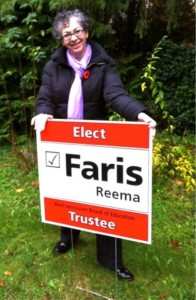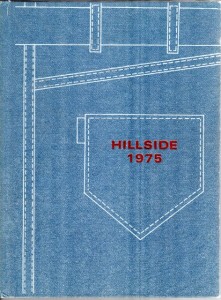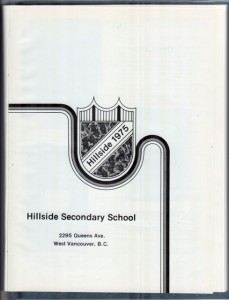Posts Tagged ‘West Vancouver’
The Tracks Of Her Tears
I saw the mother of a young man cry last week.
Her tears weren’t tears of grief and loss.
Rather, the tracks of her tears captured a story of love, bewilderment, perseverance, disappointment, faith, despair, relief, pride, and thankfulness.
Why?
Her son had graduated.
Such a pedestrian sound to this accomplishment: her son had graduated.
But it’s only pedestrian because high school graduation has become an expected (minimal) norm in our world.
However, it’s a mistake to assume high school graduation is automatic even in a community such as West Vancouver which boasts a 97% graduation rate.
There’s the perception that all the children in this community will make it, that they all have an easy ride.
Wrong.
It’s a mistake to assume that the glittering mantle of expensive housing, disposable income, and stable family is the reality for each child. It’s wrong to assume they will thrive in our high schools.
That’s why we have ACCESS.
Located at West Vancouver Secondary School, ACCESS
“… is an alternate school program designed to provide an opportunity for students who require this unique setting to complete the requirements for high school graduation.
In addition to the basic academic program, ACCESS also provides students with the following opportunities.
- 10 day Bowron Lakes wilderness experience
- Participate in various local outdoor activities
- Access to community youth services
- Work experience
- Apprenticeship
Admission is through an interview process…”
The ACCESS grad luncheon this past week was an opportunity to recognize the accomplishments of remarkable young people who had done what is expected of many, but which was not a guaranteed outcome for them.
And in a society which increasingly favours conformity and compliance, they did so while holding on to their unique forms of self-expression, their standout personalities, and saying “I’ll do what you ask, but I’m doing it my way”.
That is strength of character, courage, and conviction.
At ACCESS collaboration is a lifeline. There’s a dedicated team of teachers and youth workers who guide these students and who are joined by representatives from community partners such as the District of West Vancouver Community Services, the West Vancouver Police Department, Vancouver Coastal Health, the Ambleside Youth Centre, and local businesses.
In hindsight, maybe the tears of that young man’s mother did denote loss of a kind. They reflected the grief she’s carried with her knowing her son’s journey has been immeasurably tougher than many of his peers.
But there was more in her eyes.
There was joy. Despite the obstacles, her son had reached this milestone and was publicly recognized for doing so.
There was hope. Hope that it was, after all, going to be fine.
What more could I ask for than to be associated with a system which provides joy and hope to those who are at risk and vulnerable?
A system that is not taken in by the appearance of the community’s “perfection”, but which understands that unless our “diamonds in the rough” have a place to call their own, then our claims of excellence will ring hollow.
To The Graduating Class of 2013
My remarks to the Sentinel Secondary School graduating class of 2013. Another version of this presentation was delivered to the Rockridge graduating class on May 17, 2013. This is a full transcript of my words and as is typical with verbal presentations, adjustments and/or changes may have been made while speaking.
Thank you. Merci.
I’m so pleased to be here tonight. Je suis très heureuse d’être ici avec vous ce soir.
On behalf of the West Van Board of Education, my congratulations to all this year’s graduates. Félicitations!
I know many of you are wondering who is this talking head and why does she get to speak at my grad?
Well, in the November 2011 municipal elections I and four others were elected by West Van residents to serve as Trustees on the Board of Education.
That means my colleagues and I help to oversee the public education system in our community and that along with your teachers, the staff at the school and the district, parents and yourselves, we have a measure of responsibility and accountability for your education from kindergarten through to Grade 12.
I also happen to be a graduate of school district 45.
Even though I’ve been around the District on and off since I was twelve, and even though I’ve been to Sentinel a number of times, I wanted to get a better feel for the school and its students before I spoke tonight.
I phoned up Principal Mike Finch and asked if we could tour the school together. And we did. I got to see some of you at work and some of you at play. I had a look into many of the classrooms and then I asked Mr. Finch to tell me about you, to tell me about students at Sentinel.
I’m just gonna give you a moment to think about what he told me.
No, he didn’t say that. Oh, he’d never say that, would he? No way. Uhuh.
What he did tell me is how impressed he has been by the students at Sentinel. How dedicated you are and how motivated you are to succeed on your own terms whether you’re studying French, pursuing your athletic interests in the academies, or being super achievers.
Barb Sunday, one of your amazing art leaders told me during my visit to the school, that she’d sent off about 50 advanced placement art portfolios for consideration. 50! And if you stop by the Ferry Building Gallery at the foot of 14th Street, you’ll see some of that art on display.
What you’ll also see there is the commitment you’ve made to pursuing your passions and the care you’ve taken to excel in the work you do.
And tonight we’re here to celebrate your accomplishments.
For parents, it’s a bittersweet moment, likely tinged with a sense of relief! Tonight is a chance to celebrate the wonderful individuals you’ve become and yet we also have to be prepared to let you go.
That’s what parents do.
And like parents, the teachers, the administration, and all the staff of the West Van school district – even Trustees, we all have to do our best to make sure you grads have the skills and talents you need to continue to succeed. And now you’re moving on.
But it’s not easy as parents or teachers or administrators to let you go because we know that the journey can sometimes be a challenge.
I would like to share with you some words by the Lebanese poet Kahlil Gibran. In his poem on children, he writes:
Your children are not your children.
They are the sons and daughters of Life’s longing for itself.
They come through you but not from you,
And though they are with you yet they belong not to you.
You may give them your love but not your thoughts,
For they have their own thoughts.
You may house their bodies but not their souls,
For their souls dwell in the house of tomorrow, which you cannot visit, not even in your dreams.
As Gibran says, you, our graduates, you live in tomorrow and we are not here to stand in your way.
You’ve worked hard or maybe you haven’t. You’ve had good days and bad. You’ve made friends, you’ve lost friends. You’ve studied, you’ve learned. You’ve been on a journey and now you’re set for the next stage of life whatever that may be for you.
And what do you need to successfully navigate what’s ahead?
To borrow the words of Canadian musicians David Myles and Classified, you need to embrace your inner ninja.
Be fierce and determined and passionate. Dream big and take action.
Stand up for yourself. More importantly, stand up for others.
Stand up for what you believe. More importantly, be tolerant and allow others to speak up for what they believe.
Stand up for what is right. More importantly, be open to different views and adjust your ideas if warranted.
And finally, Sentinel grads, take all that we — the community, the school District, the administration, your teachers, and your parents — take all that we have given you, take all that you are, and make the world you are inheriting, make it better.
Make the world better for you, for me, and for those who have so much less than either of us.
I know you can do it. I know you can do it.
Thank you and bonne chance!
Crazy Little Thing Called Twitter And The FSAs
At first I lurked.
I’d log on to Twitter.com and scroll through the streams, fascinated.
I started to tweet in support of my campaign during the 2011 civic election and now it’s part of my daily routine.
With Twitter, I keep an eye on my community. I get news from around the world. I read analyses of issues and events from different perspectives. I interact with well-known figures and people in faraway places, opportunities I may never have had otherwise.
Twitter is also ugly at times, “nasty, brutish, and short” in the words of Thomas Hobbes. And while it is liberating to talk to so many so easily, Twitter is also constraining.
Why?
My Twitter account is a mirror of who I am as a whole person, but that whole person includes being a public figure. I have to be aware that although I am speaking personally, some may mistakenly take my views as those of the West Vancouver Board of Education. I have to be aware that while I distinguish between the different hats I wear in life and the various roles I play, others may not.

Which brings me to the Foundation Skills Assessment (FSAs), a test administered to Grade 4 and Grade 7 students throughout British Columbia.
Twitter streams were on fire about the FSAs recently, but I kept mum. I felt that whatever I said in 140 characters could be mischaracterized.
Here’s some of what I wanted to say.
As a parent, I had no objection to my child writing the FSA. As a Trustee, I see value in the data collected because it can be used to align resources with demonstrated need.
Here’s the problem: what we want the FSA to do and what is done with the FSA results have diverged.
FSA data, in addition to use by the provincial government and by school districts, is used by a third-party organization to rank schools.
The Fraser Institute rankings are myopic: they claim to present an overall picture of a school, but the rankings seem to be unduly weighted on one factor, FSA scores.
Rather than the FSA, why not invest in developing literacy screeners for key grades, the results of which would be privately held and exclusively used by the school, the district, and the student’s family? I’m thinking of something like the early literacy screening used for kindergarten students in West Vancouver.
And while I acknowledge that provincial measures are needed for accountability purposes, perhaps a better method of tracking student performance could be determined through a consultative process with key partner groups.
Perhaps by separating the two requirements — diagnostic and reporting — and by creating mechanisms for each, we would be spared the yearly rankling spectacle of school rankings.
At our January public board meeting, Sandra-Lynn Shortall, District Principal – Early Learning, paraphrased a conversation she’d had with Dr. Stuart Shanker. “Early intervention,” she said, “is not the answer to helping students address their needs, rather it’s continuous intervention and connectedness.”
Just as Twitter is not always the best mode of communication, the FSA may not be the best mechanism to match vulnerable or struggling students with the continuing supports they need to succeed in our public education system.
I think we can do better.
Year One Retrospective
A year ago, I was elected as a Trustee to the West Vancouver Board of Education and it’s been an honour to work on behalf of this community. I’ve lived most of my life here, I’m a graduate of the school district in which I now play a role, and I’m fortunate I’m able to raise my child here.
As a public education community, we’re very lucky in West Vancouver. We have a great administrative team, we have inspiring leadership from our Superintendent, we have incredible staff, we have a caring Board, and we have a cadre of educators who are diligent, dedicated, and determined to deliver the highest quality teaching and learning.
We’re also favoured in that our community highly values education and families here generally have the means to ensure the best for their children. And yet, even with all these advantages, I see any number of troubling issues which appear to characterize the public education system in British Columbia.
And so, when I’m asked about my experience as a Trustee, my inclination is to say that the system is more complex and complicated than I realized despite having been an active parent-volunteer for five years before choosing to run for office.
Why?
In part, I think, because there are many different interpretations of the generally agreed upon underlying principle which I see as “the best interest of the child”.
Is the core purpose of education the success of the individual child or is it the betterment of society? Do parents know what’s best for their child or do teachers? Is an educator an autonomous professional or an expert member of a team?
I’m sure any one of us could generate an endless list of questions on the big picture of education, but then there are the practicalities. How is the provincial government able to show that funding per pupil is at an all time high while school districts have to nip, tuck, or cut programs and services in order to balance budgets? Given that 80% of a school district’s budget is consumed by salaries and benefits, how can innovative projects be implemented when resources are so constrained? How can infrastructure be maintained and new capital projects be contemplated with no additional funding?
Despite the seemingly intractable challenges, there’s no doubt in my mind that we have to do everything we can to foster dialogue on this issue. That education needs to be made the highest priority in this province, that we have to find a way to work collaboratively to make our strong system better.
The reason is simple. Education is the path to a more just and more equitable world.
And while it may be difficult to hold on to this truth given the evidence of the harm humans continue to do to the earth and to each other, it is why I remain committed to doing the best I can, for public education, in the remaining two years of my term.
Opening Day 2012 And A 1974 Flashback
Last Thursday, I had the pleasure of hearing Dr. Jennifer James speak at the Opening Day celebration for our school district.
Held at West Vancouver’s Kay Meek Theatre, the event drew over 500 teachers, administrators, staff, trustees, partner-representatives, and parent-representatives to join in honouring 20-year employees, to hear from the Board Chair and the Superintendent, to learn from a distinguished speaker, and to be moved — in my case to tears — by a slideshow presentation with highlights from the past year.
In her presentation, Dr. James masterfully outlined the cultural shifts we’re experiencing and the challenges they present particularly to educators. In relating her vision, her experience, and her understanding, Dr. James also shared details of personal issues she’s contending with today and some she had to overcome as a child.
As the theatre emptied and the exuberant buzz faded, I thanked Dr. James and commended her on being so candid about her family life. “Well,” she said after a pause, “education is personal.”
And it is.
Why?
Because our educational experiences stay with us, shape us, and guide us as we negotiate our daily lives, our relationships, and our careers. For Dr. James, her education included interactions with a Grade 4 teacher she “hated” and a high school teacher she adored. The former dismissed her, penalized her, and undercut her self-esteem. The latter noticed her, cared about her, and took action to ensure that she made it to college despite her difficult family situation.
Her story inspired me to reflect on one of my own.
It was 1974 and we’d just settled in West Vancouver after moving back to Canada from Lebanon.
I knew no one.
I was moving from an all-girls school where we wore uniforms every day to a mixed gender school where student outfits tended mostly to jeans sporting gaping holes.
On the first day of Grade 8, I missed the bus.
I snagged a ride from my father after traipsing back home.
Having reached Hillside Secondary, I made my way into a buzzing school gym of 1,200 students arrayed along the bleachers.
Darting curious glances here and there, I sat through the roll call which ended without my name being called.
So after arriving late, after the anxiety of missing the bus, after feeling as if I’d never find my way, I was escorted to Mrs. Haagen’s classroom, Division 82.
And as the last one in, in my plaid-skirted dress with white knee high socks and black patent shoes, I was awarded an undesirable front row seat inspiring a chorus of “A-reema, a-reema, a-rrrreeemmma” from the boys in the back which would haunt me as the year progressed.
It sucked and I believe the ramifications are with me still.
But it’s important to share our stories, positive or negative, because education is personal.
And to all those students facing their first day of school this week, I wish you the very best in your personal journey and, above all, I wish you kindness.
Because as Dr. James also said, education is at the core of civilization and the heart of that is kindness.




